Red, Dead, Renewed (Part 2)
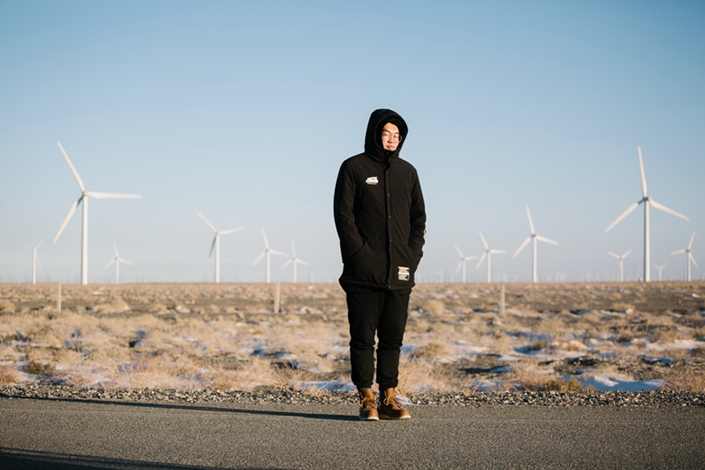
This is the second installment in a two-part series. To read the first part, click here.
(Sixth Tone) — Compared with the oil town’s postindustrial poverty, New Yumen is booming. Yet its rise has largely excluded the families of those who built its predecessor.
Most new migrants to New Yumen aren’t complaining, though. In recent years, significant numbers of young, college-educated workers have converged on the city to take on skilled jobs in the renewables industry. Lying in a natural wind gap, New Yumen is surrounded by the Jiuquan Wind Power Base, an ambitious government-backed project to help wean China off polluting fossil fuels.
Over the past decade, at least five state-backed energy companies have set up shop on the wind base. Twenty-four-year-old Luo Kai works for one of them as a turbine maintenance engineer. He declines to name his employer as he is not authorized to speak to the media.
The wind industry has been a boon for people like Luo, who was born in the neighboring city of Zhangye to parents who ran a small supermarket. He majored in energy engineering and automation at university, and after graduating, moved to New Yumen in 2016. He works eight days on, six days off, monitoring his company’s wind turbines and sometimes driving through the Gobi Desert for several hours to fix faulty machines. For his endeavors, Luo earns between 4,000 yuan ($572) and 6,000 yuan per month, depending on bonuses — significantly more than Yumen’s average wage — and receives free room and board in the company dormitory.
On a freezing afternoon, Luo accompanies us to a wind-whipped viewing area outside New Yumen, where the barren plains are carpeted with neat rows of sleek white turbines. Normally reticent, he loosens up a little, pointing out his company’s turbines, explaining the differences between newer and older models, and reflecting on the nature of his work. Although it’s not perfect — there are times when the job feels monotonous or stressful — he says he’s broadly satisfied.
Crucially, however, Luo feels far less tied to the wind farm. Whereas Du speaks of life at the refinery with the tone of a man seeing out a jail sentence, Luo retains an optimism that may just be youthful exuberance, but reflects the self-confidence of someone whose qualifications potentially guarantee him a long and varied future in China’s fast-growing wind industry. He sees his current role as just a job, not a lifelong calling, and aims to spend the next few years saving money, getting promoted to technician, and maybe finding a wife before moving somewhere else.
Luo’s sense of transience extends to his adopted city. Despite living here for three years, he hasn’t made many friends or put down deep roots. On his days off, he usually travels back to Zhangye to sleep, hit the gym, and see old friends. “There’s no need for me to stay here,” he says. “I only have to be here for work.”
That feeling pervades large parts of New Yumen, whose shiny surfaces tend to gloss over the sense that the city lacks the community spirit of its grubbier, older cousin. Like many new Chinese towns, New Yumen feels built to grow, its wide plazas and airy shopping malls distinctly more sterile and less cozy than the oil town over the horizon.
The city’s sense of bloat even seeps into its industrial figures. By certain metrics, New Yumen has been a success: Renewable energy production is growing rapidly, with local wind power generation standing at 3,430 gigawatt hours in 2017 — a 31.5% increase on the previous year. Plans are afoot to expand the potential power of the Jiuquan Wind Power Base to 20 gigawatts by 2020 — nearly as much as the maximum generating power of the Three Gorges Dam, the world’s largest energy plant by installed capacity.
Those headline figures have contributed to local economic growth. Including both the oil town and the new city, Yumen’s GDP grew 4.6% between 2017 and 2018, a similar rate to the year prior, according to the local government. Although that figure is lower than the provincial average, residents’ disposable incomes rose by around 9% during the same period, an increase that helped Yumen officially meet its poverty alleviation targets in April this year, ahead of a much-touted 2020 deadline.
 |
Wang Xiaoying, the official communicator of the “Iron Spirit” at the Yumen City Museum waits for tourists to finish watching a documentary in a period room in Gansu province, Dec. 13, 2018. Photo: Wu Huiyuan/Sixth Tone |
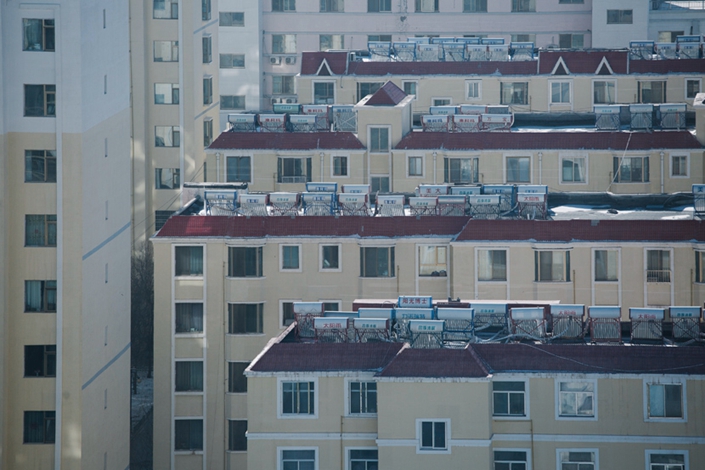 |
Solar installations on residential buildings in New Yumen, Gansu province, Dec. 10, 2018. Photo: Wu Huiyuan/Sixth Tone |
But those headline figures mask the fact that New Yumen’s growth has centered around China’s deeply inefficient wind industry. Up to 60% of the produced power of certain companies at the Jiuquan Wind Power Base gets curtailed each year, according to a 2017 news report.
It’s a nationwide problem. In the early 2010s, many Chinese wind companies, backed by generous government subsidies, rapidly deployed thousands of turbines in areas far from centers of power demand. The country’s electricity storage and transmission systems failed to keep abreast of this development, meaning that much of the turbines’ power was wasted. From 2010 to 2016, more than 150,000 gigawatt hours — around 16% of overall wind generation — was abandoned, according to a 2018 study by the Brookings-Tsinghua Center, a research institute. Although the country squanders less wind energy today, overcapacity continues to dog the sector: In March, the government halted wind projects in northwestern China, including Gansu, due to wastage.
But perhaps most deeply of all, New Yumen’s razzle-dazzle has sown bitterness in the oil community that was here first. No oil workers Sixth Tone speaks to say they know anyone in their line of work who successfully retrained in the renewables sector, and few of the profits it generates seem to trickle back to the rusting old town. “I see them as two completely different cities,” says Bei, the safety inspector. “It breaks my heart to see people left living in the old town because of financial (and other kinds of) pressure. But people in New Yumen live pretty good lives. It makes people jealous.”
That sense of bifurcation has all but destroyed any faith Bei once had in the benefits of renewables. “Wind energy, solar energy — they’re just an appearance,” he laments. “They don’t bring genuine economic development.”
Generation gap
In recent years, Old Yumen has been trying to rev up its sputtering economy by repackaging its socialist history for well-heeled domestic tourists. The idea isn’t unique in China: Other areas with limited industrial palettes, like the northern steel hub of Baotou and the former model village of Dazhai, have sought to cash in on so-called “red tourism.”
Old Yumen’s gamble may yet pay off. But if it does, it’ll be against the odds. China’s single-resource towns are disproportionately located in far-flung, hard-to-access locations — places whose post-reform futures the planned economy couldn’t plan for. Additionally, red tourism spots tend to ham up the nostalgia factor for older visitors who experienced socialism the first time around. They struggle to articulate a vision of revitalization for younger people who cleave to a very different set of values.
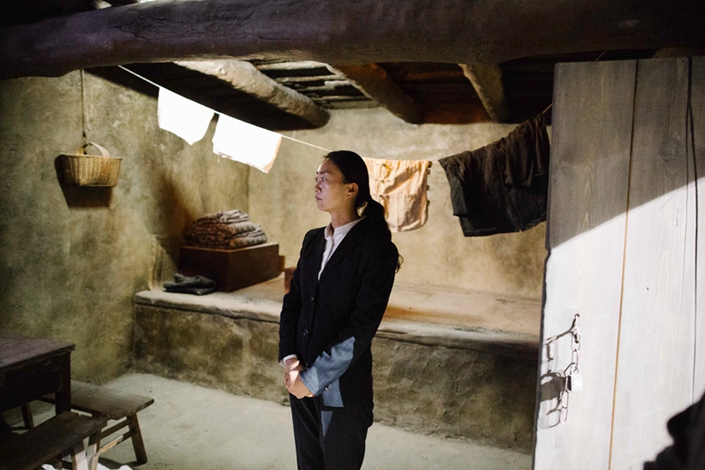 |
Wang Xiaoying, the official communicator of the “Iron Spirit” at the Yumen City Museum waits for tourists to finish watching a documentary in a period room in Gansu province, Dec. 13, 2018. Photo: Wu Huiyuan/Sixth Tone |
One person trying to resuscitate Old Yumen’s former glories is 32-year-old Wang Xiaoying, a senior staff member at one of the town’s few new buildings: a museum commemorating the life of Wang Jinxi, the town’s most famous son and one of China’s best-known socialist heroes. Built with government funding and completed last October, officials hope that the museum will preserve the history of Old Yumen, popularize its Iron Spirit, and draw domestic tourists to a town firmly off the beaten track.
Wang Xiaoying — who is not related to Wang Jinxi — is one of the few people raised in Old Yumen who chose to return after studying and working in wealthier, more cosmopolitan cities. The provincial capital of Lanzhou, and later Beijing, left her dissatisfied with urban China’s fast-paced lifestyles and empty materialism, and felt somewhat at odds with the values she had internalized since studying Wang Jinxi at school.
Instead, Wang Xiaoying came back to her hometown and became the museum’s official communicator of the Iron Spirit, a vague jumble of ethical axioms supposedly embodied by Wang Jinxi. They include fearing neither hardship nor exhaustion; making the best of what you have and making something of what you don’t; and struggling for the good of the nation. Despite their airiness, several oil workers Sixth Tone speaks to can rattle off the slogans with little prompting.
As the story goes, Wang was born in 1923 to an impoverished peasant family in the village of Chijinbao, near Old Yumen. As a child, he herded sheep and sometimes begged in the streets; when he reached his teens, he began working at the oil field, where in 1950 he became one of Communist China’s first oil drillers. Later, he rose to the rank of brigade captain and became a member of the party, which in 1959 bestowed on him the title of “national model worker.”
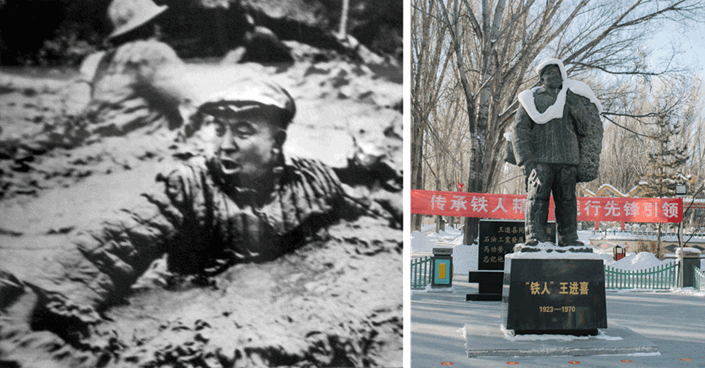 |
Left: A publicity photo of Wang Jinxi shows the “Iron Man” stirring cement with his body to contain a well blowout. IC; Right: A statue of Wang Jinxi in Old Yumen’s Oil Park, Gansu province, Dec. 13, 2018. Photo: Wu Huiyuan/Sixth Tone |
The following year, as part of the country’s plan to achieve oil self-sufficiency, Wang Jinxi’s drilling brigade was tasked with opening up China’s largest oil field in Daqing. It was here that Wang cemented his place in the party’s hall of fame, reportedly toiling away tirelessly for five days in temperatures as low as minus 30 degrees Celsius before finally striking oil (apparently to cries of “Long live Chairman Mao!”), and earning his nickname — “tieren,” or “Iron Man” — from his comrades.
Even before Wang Jinxi died of stomach cancer in 1970, the party had begun to deify him, taking the scant details of his life, mixing them with national narratives of industrial development, and adding a dash of party dogma to craft the Iron Man’s image: strong, unyielding, and ideologically pure. By the mid-’60s, his swarthy face was appearing on propaganda posters, gazing dashingly into some out-of-shot socialist utopia, exhorting people to throw themselves into building national industry. Old Yumen, the community synonymous with Wang Jinxi, was also said to embody his “Iron Spirit.”
We’re the museum’s only visitors that afternoon. Wang Xiaoying meets us in the lobby under a towering bronze-colored statue of Wang Jinxi, all chiseled features and straining muscles. Beside each exhibit, Wang Xiaoying pauses, adopts an expression of studied awe, and gives fervent, almost proselytizing, speeches about Wang Jinxi’s accomplishments. She is adamant that the Iron Spirit remains relevant, despite the far-reaching political and economic reforms that have profoundly changed China since the 1980s. “It will never become obsolete,” she says. “Some things, like struggling through hardship, seeking truth from facts — these apply to any place in any era.”
But that’s not necessarily what youngsters in New Yumen think. “We don’t think about (Wang Jinxi) very much,” says local entrepreneur Ge Ting. “We might think that he did his job well and we should learn from him, but at the end of the day, I wouldn’t say any of that sinks in very deeply.”
Perhaps no establishment captures New Yumen’s energy better than Ge’s. The 25-year-old co-runs the city’s only craft beer pub, a haven for hipsterish youngsters with a taste for imported ales, loud pop music, and foreign fashion brands.
After the customers thin out one evening, Ge and her co-manager, Ma Ying — a teetotal Hui Muslim from Lanzhou — sit down and tell the story of how the bar came to be. The pair met in 2017 after Ma joined the same beauty parlor as Ge. Despite the regular hours and steady salaries, the two women felt unfulfilled, spending long periods of the day idle and having little to do in the evenings. “If you wanted to drink stuff like this, you’d have to go to Jiayuguan,” Ge says, referring to a large city some two hours’ drive away.
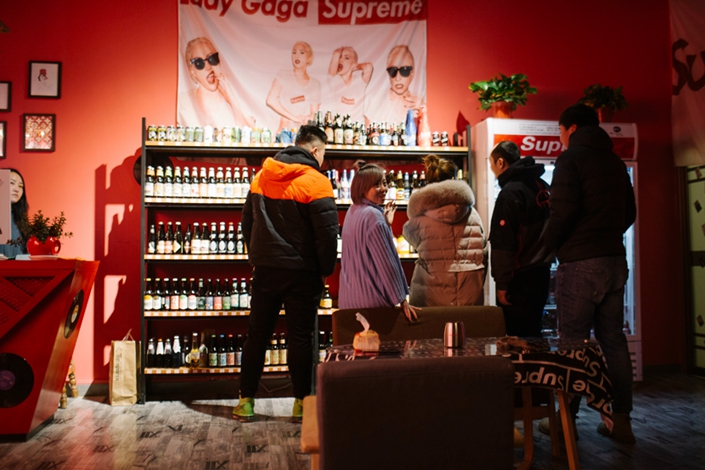 |
Ge Ting, the owner of a craft beer pub, recommends beers to customers in New Yumen, Gansu province, Dec. 14, 2018. Photo: Wu Huiyuan/Sixth Tone |
So, in a “spur-of-the-moment” decision last year, Ge and Ma decided to open their own bar. They rented a space next to one of New Yumen’s high-rise business hotels and set about decorating it themselves. Their bar has hot-pink walls with giant white plastic lettering spelling out the word “Supreme” in a style mimicking the well-known American streetwear outlet. A large flag bears the face of popstar Lady Gaga. As you might expect from two people who by day still work in the beauty industry, Ge and Ma themselves are immaculately groomed, wearing deftly applied makeup, dyed hair, and artfully scruffy clothes.
The bar feels as far from Old Yumen’s tired-looking noodle joints and snooker halls as it is possible to be. And perhaps that’s not surprising: Even Ge, who was raised in New Yumen when it was still a semirural backwater and used to entertain herself by playing with frogs by the river, has no interest in visiting Old Yumen, let alone living there — “only if the rent here became far too high,” she laughs.
Sometimes, when she was young, Ge’s grandparents told her stories about Wang Jinxi. While she enjoyed them, she feels they resonated much more with her older relatives than with the children of China’s more individualistic post-reform generations. “I suppose it’s similar to liking a celebrity,” she says. “But I just don’t feel like he has much of a connection to what we do now.”
Red star fading
Along the ramrod-straight highway a couple miles out from Old Yumen, flanked on either side by distant, blue-gray mountains, stands a beaten-up plastic model of a smiling police officer, one hand raised in a permanent wave. Tellingly, it gazes not toward the distant horizon, but back toward the town — not welcoming newcomers, but bidding farewell to those who leave.
Recent projects aimed at bringing some life back to Old Yumen have struggled to make people stay. Staff at the museum to Wang Jinxi say they have received a few red tourists, and officials have added an academy for party cadres next door. In addition, a number of artists, photographers, and filmmakers, drawn by the town’s dramatic landscapes and time capsule-like charm, have temporarily taken up residence there. Last year, as part of an organized street-art tour, a group of more than 10 international graffiti artists converged on Old Yumen and spray-painted a vast orange-and-black robot, complete with glaring neon-green eyes, on an abandoned recreation ground. They called it “Iron Man.”
But ultimately, the tourists’ vacations end, the cadres get deployed elsewhere, and the artists return home. Even the pockets of chatting oil workers clustering along Refinery Street and in the small market don’t settle here permanently anymore. Bei, the safety inspector, often feels compelled to grab his camera and document the town’s demise. “Nowadays, when I photograph Old Yumen, I constantly go back to the question of why it had to decline,” he says. “It makes me very sad. I don’t think things should have come to this. It was certainly man-made.”
Perhaps emboldened by the town’s low expectations, those who do choose to live in Old Yumen tend toward somewhat eccentric pursuits. Away from the oil businesses, we met many other vibrant characters: the shifty-eyed wheeler-dealer hawking secondhand electronics in the hospital-cum-junkyard; the gold-toothed Hui merchant who sold goji berries from the back room of a disused mosque; the kiosk owner who bought a home in Old Yumen right before property prices collapsed, lost much of his savings, and more than a decade later spends his evenings writing calligraphy and screeching away on the zither in a fashion that, even to the untrained ear, sounded terrible.
Many of these people declined to be formally interviewed. Some said they were ill-informed about the town, others professed shyness, and one or two simply refused to say anything more. Several other interviews were interrupted after drawing the attention of local authorities. To protect them from potential repercussions, we did not quote those interviewees in this piece.
Neither the Yumen municipal government nor the Gansu provincial government responded to Sixth Tone’s multiple requests for comment on the health of the region’s oil community and energy industries. We received similar treatment from PetroChina and four of the five wind companies operating in Yumen. One initially willing wind firm later declined our interview request after conferring with its provincial headquarters.
 |
A tourist takes photos of the Laojunmiao oil-producing region in Old Yumen, Gansu province, Dec. 14, 2018. The caves once served as dorms and living units for oil workers. Photo: Wu Huiyuan/Sixth Tone |
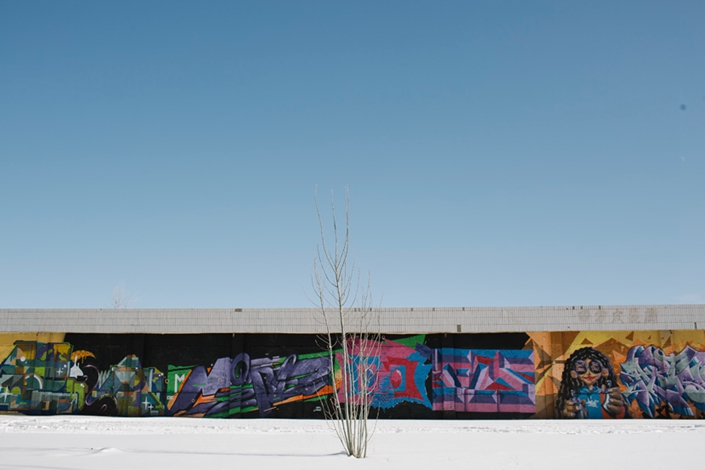 |
Graffiti on the outer wall of Yumen Stadium, which was commissioned by the Yumen government in 2018 for an ironman triathlon held in Old Yumen, Gansu province, Dec. 13, 2018. Photo: Wu Huiyuan/Sixth Tone |
Officials say 100 years’ worth of oil once lay in Old Yumen’s fields. If that’s accurate, then the town has about 20 years left. What will happen to it after that is unclear.
Wang Xiaoying, the head of the museum, is defiant. “Will we be the last generation of oil people in Yumen? No, after we’ve stopped extracting the oil, we’ll just refine it,” she asserts. “(Chinese workers) are striking oil in Sudan, in Chad … and (oil companies) are bringing it back batch by batch.”
But Du, the refinery worker, is not so confident. “We do worry that this will all disappear. Sometimes, in our downtime, we talk about it — whether our generation will be safe, whether this enterprise will be able to sustain us. But small-time workers like us don’t decide what happens — that’s for our leaders to decide.”
He shifts his weight onto his other foot and looks down at the pump jacks resting, heads bowed, in the valley below. “All we can do is to finish the job as professionally as we possibly can. A good day’s work becomes a good year’s work, and then a good life’s work. That’s the Iron Spirit, too.”
Additional reporting: Wu Huiyuan; editor: Kevin Schoenmakers.
This story was originally published by Sixth Tone
Contact editor Yang Ge (geyang@caixin.com)

- 1China Officials Dismiss Tax Hike Rumors After Tech Selloff
- 2Cover Story: How Gutter Oil Became a Prized Fuel for International Airlines
- 3Prominent Chinese Journalist Liu Hu Detained by Police in Chengdu
- 4Maersk Unit Takes Over CK Hutchison Panama Ports After Court Ruling
- 5China Provinces Set Cautious 2026 Growth Targets
- 1Power To The People: Pintec Serves A Booming Consumer Class
- 2Largest hotel group in Europe accepts UnionPay
- 3UnionPay mobile QuickPass debuts in Hong Kong
- 4UnionPay International launches premium catering privilege U Dining Collection
- 5UnionPay International’s U Plan has covered over 1600 stores overseas



